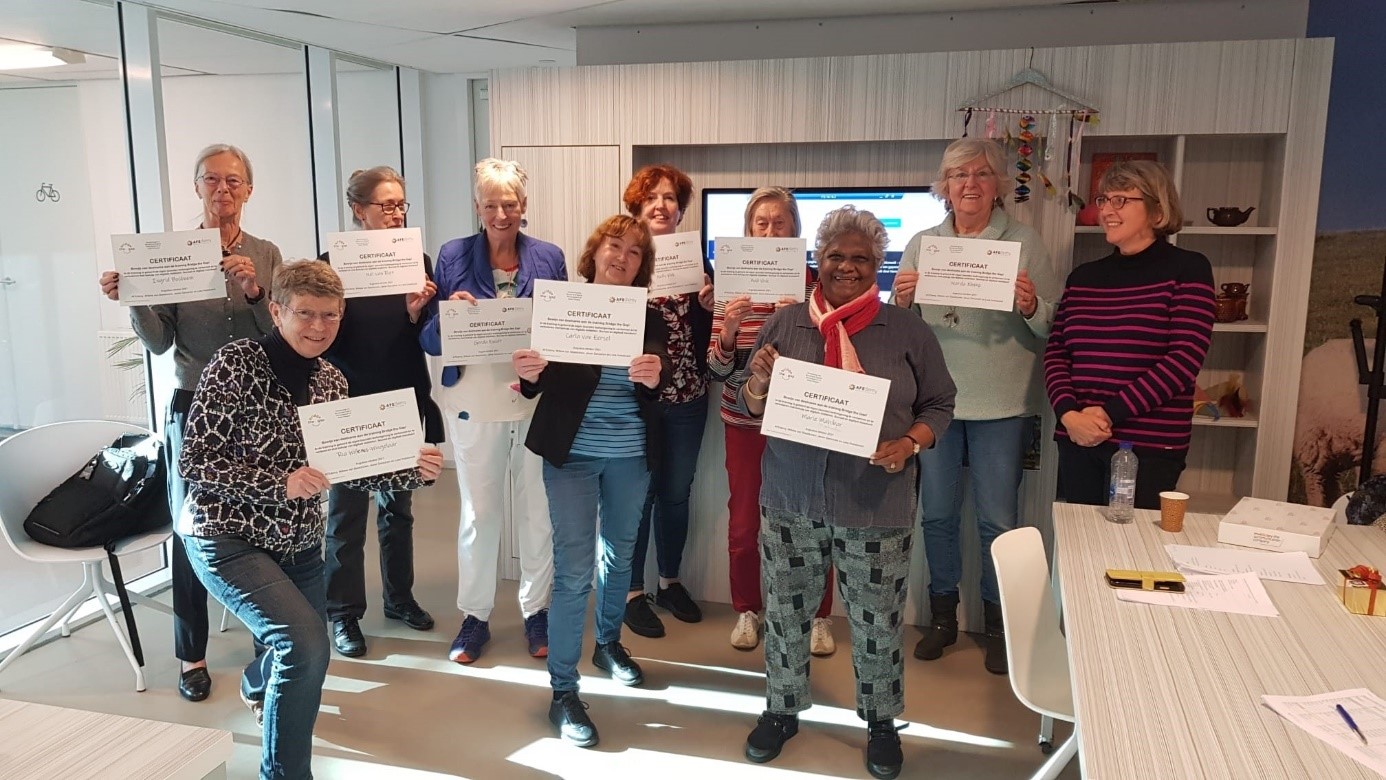Report on the training of 24 older people within the framework of the Erasmus project Bridge the Gap!
By Loes Hulsebosch and Willeke van Staalduinen, AFEdemy
“I have learned not to be afraid to go digital anymore”, “Learned how to use my smartphone” and “Now I know how to search the internet for more information”. These are just a few of the points from the evaluation of the workshops for older people as part of the Erasmus+ project Bridge the Gap!. In the project, older people learn digital skills through practice. An approach that works to teach older adults to participate socially and digitally.
From August to November 2021, 6 workshops for Social and Digital Participation by Older People took place in The Hague and Gouda every two weeks. Each workshop lasted 2 hours and was held in the libraries Leyweg and Spui and at the office of AFEdemy in Gouda. 24 older people (aged 64 to 85) divided into three groups actively participated. Their background varied from cashier, consultant to jobs at university level. The digital skills of the participants also varied widely, from only having a smartphone to being experienced with WhatsApp, taking and sending photos and being able to download and activate the CoronaCheckApp themselves. The trainings were given by Loes Hulsebosch (independent consultant and amongst others quartermaster and project leader of the iZi Experience House and Community) and Willeke van Staalduinen (owner of AFEdemy BV which aims at realising smart inclusive societies).
The workshop cycle began with an inventory of the wishes and needs of older people with regard to a senior-friendly or age-friendly environment. The age-friendly city model of the World Health Organisation was explained, after which the participants individually indicated what they thought was most important for themselves or for others and why. They considered the most important themes to be: accessibility and outdoor spaces, mobility and transport, public information, care and technology and social participation.
Each subsequent workshop dealt with one of the themes. Sometimes a guest speaker was present. We also paid a working visit to the iZi experience home and Schroeder’s Technotheek. During the workshops, we started each time with an inventory of what the participants had been struggling with in the past weeks and whether they had practised their homework digitally. Assignments included: technology detective, typing on Google or scanning QR codes. We then asked the participants to look up on their mobile phones or tablets what they understood a particular theme to be and why they thought it was important for themselves or for older people in general. The participants also looked up additional information and solutions for challenges digitally.
Meanwhile, the participants practised their digital skills in a practical way, such as learning how to connect to WIFI, learning what is a cloud and what are cookies, downloading apps, QR codes, DigiD, organising photos, recording searches, listening to the text on a website, privacy and social media. We answered questions about how to use their mobile phones or tablets (Android and iOS) by practising with the participants individually and in groups.
Right from the start, the participants were very enthusiastic. They liked the practical way of practising with their mobile phones or tablets and that their individual questions were answered immediately. The thematic approach was also much appreciated, although guest speakers were less appreciated because they interrupted the flow of the workshops.
The workshops were rated very highly. According to many participants, the number of workshops could be more. We hope that they will continue the practice of digital daily living (not adl but ddl) either among themselves or through the help agencies provided (library (Elderly in the neighbourhood), iZi community, Seniorweb, Student at Home, etc.).
We also asked the participants what they had learned:
- To search websites and get information from them;
- Apps can be downloaded, including the CoronaCheckApp;
- Working with my DigiD number
- Not being afraid to go digital anymore
- Use my phone
In conclusion:
Social and digital participation is a very relevant topic for older adults. There is a great demand for such training courses, in which practising digital skills is part of everyday life. And not the other way around. A sequel has already started: illiterate people learn how to use the talk function on their mobile phone and listen to the answers. Digital accessibility is extremely important.

